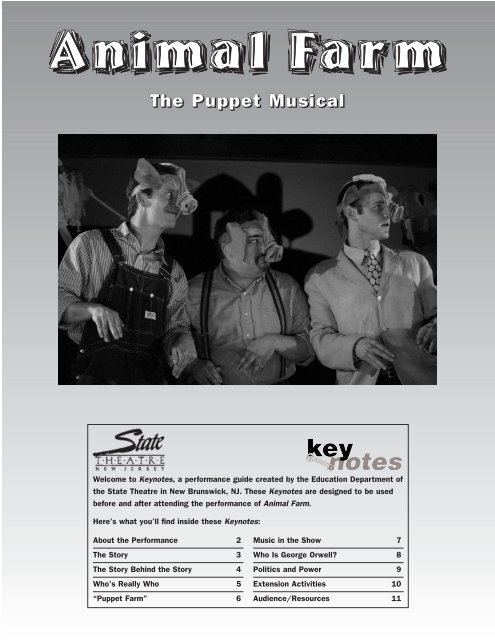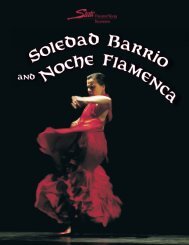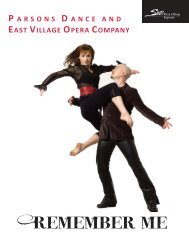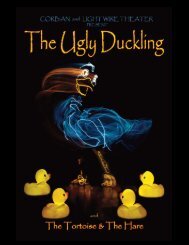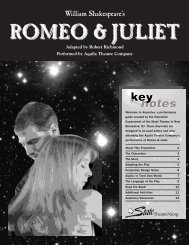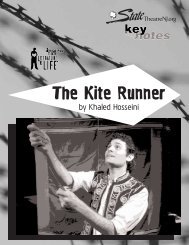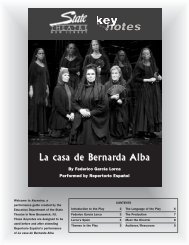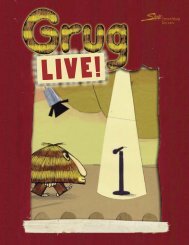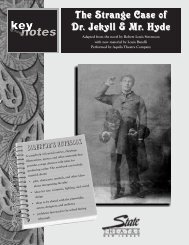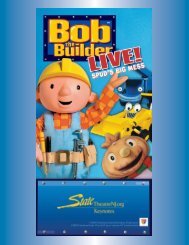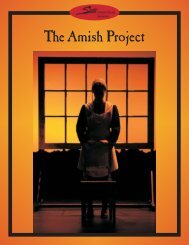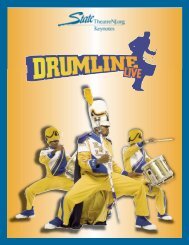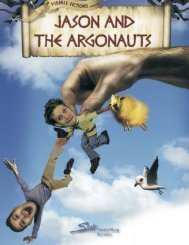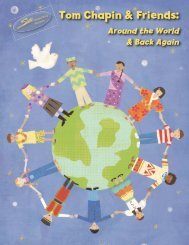Animal Farm - State Theatre
Animal Farm - State Theatre
Animal Farm - State Theatre
Create successful ePaper yourself
Turn your PDF publications into a flip-book with our unique Google optimized e-Paper software.
<strong>Animal</strong> <strong>Farm</strong><br />
The Puppet Musical<br />
Welcome to Keynotes, a performance guide created by the Education Department of<br />
the <strong>State</strong> <strong>Theatre</strong> in New Brunswick, NJ. These Keynotes are designed to be used<br />
before and after attending the performance of <strong>Animal</strong> <strong>Farm</strong>.<br />
Here’s what you’ll find inside these Keynotes:<br />
About the Performance 2<br />
The Story 3<br />
The Story Behind the Story 4<br />
Who’s Really Who 5<br />
“Puppet <strong>Farm</strong>” 6<br />
Music in the Show 7<br />
Who Is George Orwell 8<br />
Politics and Power 9<br />
Extension Activities 10<br />
Audience/Resources 11
About the Performance 2<br />
The show you will see, <strong>Animal</strong> <strong>Farm</strong> is a puppet<br />
musical produced by Synapse Productions in New<br />
York. Based on the novel by George Orwell, the show<br />
was originally adapted for<br />
ADAPTED - changed<br />
the stage by Sir Peter Hall<br />
so that it will work in<br />
for England’s Royal National<br />
a different medium<br />
<strong>Theatre</strong>. In his adaptation,<br />
(for example, turning<br />
Sir Peter kept the story and<br />
a novel into a movie<br />
much of the dialogue from<br />
or a painting into a<br />
the book. In some places,<br />
ballet)<br />
however, he cut text, added<br />
to it, or turned it into a song. He kept most (but not<br />
all) of the characters from the book and added a new<br />
one: a rat who serves as narrator. The music is by<br />
Richard Peaslee; lyrics are by Adrian Mitchell.<br />
In this production of <strong>Animal</strong> <strong>Farm</strong>, parts of the story are<br />
narrated by a rat, represented by a puppet on wheels.<br />
About the Novel<br />
George Orwell’s <strong>Animal</strong> <strong>Farm</strong> tells the story of <strong>Farm</strong>er Jones’<br />
animals, who rise up in rebellion and take over the farm. Tired of being<br />
exploited for human gain, the animals— who have human<br />
characteristics such as the power of speech—vow to create a new and<br />
more just society.<br />
Orwell subtitled the novel a “fairy story,” but it is also a satire on<br />
world politics: in particular, the former Soviet<br />
SATIRE - the use of<br />
Union. Through the story’s animal characters,<br />
ironic humor and<br />
Orwell exposes what he disliked about the<br />
sarcasm to expose<br />
Soviet system of government. Scholars have<br />
and criticize<br />
drawn parallels between the <strong>Animal</strong> <strong>Farm</strong><br />
corruption, greed,<br />
characters and real-life figures from the<br />
foolishness, etc.<br />
Russian Revolution—for example, linking the<br />
power struggle between Napoleon and Snowball to the historical<br />
feuding between Joseph Stalin and Leon Trostky for control of the<br />
Soviet Union.<br />
After <strong>Animal</strong> <strong>Farm</strong> was published in 1945, Orwell discovered that<br />
booksellers were placing his novel in the children’s section. According<br />
to his housekeeper, he began traveling from bookstore to bookstore<br />
requesting that the book be shelved with adult works. This dual<br />
identity—as children’s story and adult satire—has stayed with <strong>Animal</strong><br />
<strong>Farm</strong> for more than fifty years. The novel tells a story that people of all<br />
ages can understand and enjoy, but the political satire beneath the<br />
story offers older readers many opportunities for in-depth analysis and<br />
discussion.<br />
“In times like these it is<br />
difficult not to write<br />
satire”<br />
—Juvenal<br />
In some ways, little has changed since<br />
the first century A.D., when the Roman<br />
poet Juvenal wrote the words above. He<br />
could just as easily have been talking<br />
about our world today. Satire is<br />
everywhere in our culture: in books,<br />
magazines, music, movies, tv shows, and<br />
websites, among other places.<br />
/ Why do you think people enjoy<br />
satire<br />
/ Can you think of satires you have<br />
read, heard, or seen What do you<br />
think was the message behind the<br />
humor<br />
/ Do you believe that satire is an<br />
effective form of social criticism<br />
Why Can you find examples where<br />
a piece of satire has helped bring<br />
about change
The Story 3<br />
“All <strong>Animal</strong>s are equal. But some are more equal than others.”<br />
1 Old Major, an old pig who<br />
lives on Manor <strong>Farm</strong>, tells the<br />
2 After being neglected for two<br />
days by the drunken <strong>Farm</strong>er<br />
other animals of his vision<br />
of a farm where all animals<br />
work together as equals<br />
and there are no humans<br />
who work them mercilessly<br />
and then slaughter them.<br />
Jones, the animals revolt. They<br />
chase Jones off the farm and<br />
rename their home “<strong>Animal</strong><br />
<strong>Farm</strong>.” They agree on seven<br />
basic commandments that they<br />
will live by.<br />
3 The animals manage the farm<br />
successfully and gather<br />
4 A group of men attack the<br />
animals, only to be defeated by<br />
regularly to vote on how the place<br />
should be run. Although all are<br />
considered equal, the animals<br />
depend on Napoleon and<br />
Snowball, the two leading pigs, to<br />
make the decisions.<br />
Snowball’s bravery and clever<br />
strategy. He is awarded a medal for<br />
valor. Napoleon is envious of<br />
Snowball’s success. Mollie, a horse,<br />
misses being pampered by humans<br />
and runs away from <strong>Animal</strong> <strong>Farm</strong>.<br />
THE SEVEN<br />
COMMANDMENTS<br />
OF ANIMAL FARM<br />
1. Two-legged animals are enemies.<br />
2. Four-legged animals are friends.<br />
3. <strong>Animal</strong>s shall never wear<br />
clothes.<br />
4. <strong>Animal</strong>s shall never sleep in<br />
beds.<br />
5. <strong>Animal</strong>s shall never drink<br />
alcohol.<br />
6. <strong>Animal</strong>s shall never kill other<br />
animals.<br />
7. All animals are equals.<br />
5 Snowball comes up with a<br />
plan to build a windmill to<br />
provide electricity to help run the<br />
farm. Napoleon uses a pack of<br />
vicious dogs to drive Snowball<br />
away. He then steals the idea for<br />
the windmill, saying it was his plan<br />
all along.<br />
6 The animals work hard on the<br />
windmill. Napoleon announces<br />
7 The pigs move into <strong>Farm</strong>er<br />
Jones’ house and sleep on<br />
a plan to sell their crops to raise<br />
money to buy the materials they<br />
need to finish the windmill. This<br />
leaves the animals without enough<br />
to eat.<br />
beds, even though this violates<br />
one of their commandments. They<br />
invent an excuse to explain their<br />
behavior to the other animals, who<br />
cannot read.<br />
8 When the food supplies run<br />
out, the pigs invent stories<br />
placing all the blame on Snowball.<br />
Napoleon has his dogs kill any<br />
animal who does not support him<br />
unquestioningly. He declares<br />
himself president of the Republic<br />
of <strong>Animal</strong> <strong>Farm</strong>.<br />
9 When the<br />
windmill is<br />
finally finished,<br />
the pigs celebrate<br />
by getting drunk.<br />
10 A group of humans sneaks<br />
into <strong>Animal</strong> <strong>Farm</strong> and destroys<br />
the new windmill. Napoleon<br />
reports that<br />
Snowball has<br />
been killed and<br />
orders a<br />
celebration.<br />
11 The old horse Boxer<br />
collapses. The pigs promise to<br />
12 As the years pass, the pigs<br />
continue to trade with other<br />
take him to the veterinarian, but<br />
when the van arrives, it reads<br />
“Horse Slaughterer.” Later, the pig<br />
Squealer assures the animals that<br />
Boxer died whispering the words<br />
“Napoleon is always right.”<br />
farms. They learn to walk on two<br />
legs and replace the seven<br />
commandments of <strong>Animal</strong> <strong>Farm</strong><br />
with a single rule: “All <strong>Animal</strong>s are<br />
Equal. But some are more equal<br />
than others.”<br />
13 The pigs<br />
entertain a<br />
party of men in<br />
the old farmhouse. They drink,<br />
toast each other’s success, and<br />
form an alliance. As the animals<br />
look in from the windows, they<br />
can’t tell the pigs from the men.
The Story Behind the Story 4<br />
In <strong>Animal</strong> <strong>Farm</strong>, George Orwell uses the animal characters and their story<br />
to comment on real people and events—in this case, the Russian Revolution<br />
and its aftermath. This type of literary device is called an allegorical fable.<br />
To understand and appreciate the allegorical aspects of <strong>Animal</strong> <strong>Farm</strong>, it helps<br />
to know something about the causes and events of the Russian Revolution, one<br />
of the most important events in modern history.<br />
In the early 1900s, Russia’s lower classes were fed up with Czar Nicholas<br />
II. Under his rule, peasants and industrial workers<br />
CZAR (or TSAR) - the<br />
struggled for survival under conditions of widespread<br />
title used by the<br />
poverty, famine, and a lack of modern infrastructure.<br />
male emperors of<br />
Centuries of oppression of the lower classes by the<br />
Russia before the<br />
1917 revolution upper classes also fueled the people’s anger. They had<br />
no representation in government, and the Czar<br />
BOLSHEVIKS - the<br />
remained out of touch with their problems.<br />
Russian Social<br />
In 1917, two major events took place: the<br />
Democratic Workers’<br />
overthrow of the the czarist regime and the takeover<br />
Party, a radical leftwing<br />
group<br />
of the government by the Bolsheviks, led by<br />
Vladimir Lenin. The revolution led to the creation of<br />
the Union of Soviet Socialist Republics (USSR), also known as the Soviet<br />
Union. When Lenin died in 1924, there was a struggle for power between<br />
Leon Trotsky and Joseph Stalin. Stalin won the battle, and he sent Trotsky into<br />
permanent exile.<br />
Once in power, Stalin began to move the Soviet Union into the modern<br />
industrial age. He created Five-Year Plans for managing the economy and<br />
instituted a system of collective farms—privately-held lands that were seized<br />
by the government and turned over to the people of Russia. Through these<br />
policies, Stalin transformed the Soviet Union from a largely peasant society to<br />
a major world industrial power by the end of the 1930s.<br />
Under Stalin’s rule, however, the Soviet people lived under a network of<br />
terror in which an estimated 20 million citizens were put to death or sent to<br />
labor camps. To consolidate his power, Stalin eliminated anyone and anything<br />
he thought might threaten his authority. His government tightly controlled the<br />
flow and content of information; anyone who spoke out against him and his<br />
policies risked torture, imprisonment, or execution. Under Stalin, religion was<br />
outlawed and artists were given strict rules about what they could write, paint,<br />
sculpt, design, and compose. In attempt to erase a sense of cultural identity,<br />
over 1.5 million people from non-Russian ethnic groups were<br />
deported to Siberia and Central Asia. The authorities<br />
even tried to rewrite history; texts and<br />
photographs about notable people who had been<br />
executed by the government were removed from<br />
Soviet textbooks and other materials to make it<br />
appear as if these people never existed.<br />
“None of the animals ever<br />
mentioned Mollie again.”<br />
—Narrator, <strong>Animal</strong> <strong>Farm</strong><br />
You Say You<br />
Want a<br />
Revolution<br />
/ Why do you think<br />
revolutions occur What<br />
circumstances would lead<br />
people to overthrow the<br />
daily political and<br />
economical structure of<br />
their lives<br />
Leon Trotsky<br />
Joseph Stalin
Who’s Really Who 5<br />
In <strong>Animal</strong> <strong>Farm</strong>, the animals can be understood to represent key players, institutions, and events from the Russian<br />
Revolution. Below is an description of some of the characters in <strong>Animal</strong> <strong>Farm</strong>, as well as their historical counterparts.<br />
/ Try making your own <strong>Animal</strong> <strong>Farm</strong> character chart, replacing the Russian Revolution with an event or situation from<br />
our own time that seems to fit the story. Who would be the real-life counterparts of Mr. Jones, Napoleon, etc.<br />
ANIMAL FARM<br />
MR. JONES (FARMER)<br />
• Neglects his animals and causes them to revolt.<br />
• Could be both cruel and kind to his animals.<br />
OLD MAJOR (PIG)<br />
• Preaches the ideal of “<strong>Animal</strong>ism”: animals keep the profits of<br />
their own labor and overthrow their human masters.<br />
• Dies before the revolution.<br />
SNOWBALL (PIG)<br />
• A charismatic, well-spoken leader of the animals’ revolution.<br />
• Is idealistic; really wants to make life better for all.<br />
• Is chased away into exile by Napoleon’s dogs.<br />
NAPOLEON (PIG)<br />
• Is not a good speaker, nor as clever as Snowball.<br />
• Pretends to follow principles of “<strong>Animal</strong>ism,” but really doesn’t.<br />
• Kills his opponents to realize his ambition for power.<br />
• Uses dogs and Squealer to terrorize the animals and distort the<br />
truth.<br />
SQUEALER (PIG)<br />
• Serves as Napoleon’s mouthpiece with the other animals.<br />
• Ignores the truth; will say anything to justify Napoleon’s actions.<br />
• Keeps changing the seven commandments to support whatever<br />
Napoleon does.<br />
THE DOGS<br />
• Napoleon’s private force that uses terror to keep animals in line.<br />
• Kill or chase away anyone who opposes Napoleon.<br />
• Are completely loyal to Napoleon.<br />
BOXER (HORSE)<br />
• Strong, hard worker who believes in the principles of<br />
“<strong>Animal</strong>ism.”<br />
• Remains loyal to Napoleon, who betrays him.<br />
BENJAMIN (DONKEY)<br />
• Old, wise character who is skeptical of the animals’ revolution.<br />
• Believes that nothing ever really changes, and is proven to be<br />
right.<br />
MOLLIE (HORSE)<br />
• Vain and selfish; thinks of herself and not the other animals.<br />
• Will go along with anyone who gives her the material things she<br />
wants.<br />
RUSSIAN REVOLUTION<br />
CZAR NICHOLAS II<br />
• Neglected his people and caused them to revolt.<br />
• Could be both brutal and generous with his people.<br />
KARL MARX<br />
• Invented the concept of Communism: workers keep the profits of<br />
their own labor and overthrow the people in power.<br />
• Died before the Russian Revolution.<br />
LEON TROTSKY<br />
• A charismatic, well-spoken leader of the “October Revolution.”<br />
• Truly believed in Marx’s Communist ideas as a way to improve<br />
life for all in Russia.<br />
• Was chased into exile by Stalin’s secret police.<br />
JOSEPH STALIN<br />
• Was not a good speaker, nor as educated as Trotsky.<br />
• Pretended to be a Marxist, but really wasn’t.<br />
• Killed his opponents to realize his ambition for power.<br />
• Used secret police and propaganda to terrorize the people and<br />
distort the truth.<br />
PROPAGANDA AGENCIES<br />
• Promoted Stalin’s image as a great leader.<br />
• Used any lie to justify Stalin’s actions.<br />
• Controlled information (including what was taught in the schools)<br />
to support Stalin’s regime.<br />
KGB (SOVIET SECRET POLICE )<br />
• Stalin’s private force that used terror to keep the people in line.<br />
• Killed or brutalized anyone who opposed Stalin.<br />
• Were completely loyal to Stalin.<br />
PROLETARIAT (UNSKILLED LABOR) CLASS<br />
• Believed in Stalin as someone who would make the ideals of<br />
Communism come true.<br />
• Remained loyal to Stalin, who ignored, abused, and killed them.<br />
OLDER GENERATION<br />
• Skeptics who didn’t believe the revolution would really change<br />
anything.<br />
• Realized that Stalin was not a true Communist, but a powerhungry<br />
dictator.<br />
MIDDLE CLASS<br />
• Did not want to sacrifice themselves for the good of others.<br />
• Moved to other countries where they could pursue personal<br />
wealth and comfort.
“Puppet <strong>Farm</strong>” 6<br />
One of the unusual things about this production of <strong>Animal</strong><br />
<strong>Farm</strong> is that it is a “puppet musical.” The show uses many<br />
different types of puppets, including:<br />
• shadow puppets - flat puppets on rods or sticks that<br />
cast a shadow when the puppeteer manipulates them<br />
behind a screen. A shadow puppeteer moves the puppet<br />
in and out of the light so its shadow grows and shrinks<br />
and goes in and out of focus.<br />
• rod puppets - puppets that have sticks or wire rods<br />
attached to the neck and hands. The rods are usually held<br />
from below.<br />
• string puppets (also known as marionettes) - puppets<br />
that hang on strings and are manipulated from above.<br />
• bunraku puppets - a style from Japan in which the puppets are<br />
controlled by puppeteers dressed all in black but still visible<br />
to the audience.<br />
Most of the puppets used for the major characters are full-body<br />
puppets, meaning that the actor wears the puppet on his or her<br />
body and manipulates portions of the puppet, such as the head. This<br />
design allows the actor to become the animal, singing, dancing and<br />
moving the puppet with ease. It brings the animal to life for the<br />
audience without completely hiding the personality of the actor.<br />
Some characters, such as the pigs (seen on the left in the photo<br />
above), are portrayed by actors who wear pieces that represent the pigs’<br />
ears and snout. During the performance, notice how the “pig” actors hold<br />
their hands to look like hooves.<br />
/ Why do you think the director decided to use puppets to tell this story<br />
“Puppets transcend the<br />
earthbound world and remind<br />
us of the value of simplicity.<br />
Puppets aren’t cynical, and they<br />
aren’t selfish. Irony is not a<br />
word in their vocabulary. Above<br />
all, they are honest, earnest,<br />
hard-working storytellers.”<br />
—David Travis, Synapse Productions<br />
The illustrations below show the development of the puppet design for “Boxer,” from pen-and-ink drawing to<br />
detailed sketch, to the nearly-completed puppet.
Music in the show 7<br />
This production of <strong>Animal</strong> <strong>Farm</strong> is a musical. In a musical, the songs give added insight into the characters and also<br />
help move the plot forward. The words for some of the songs you will hear—such as the animals’ anthem, “Beasts of<br />
England”—come directly from Orwell’s novel, while others were written for the show.<br />
/ Take a look at the lyrics below. What do these songs say about the characters who sing them How do they relate<br />
to the plot of <strong>Animal</strong> <strong>Farm</strong><br />
Man’s Hymn to Man<br />
Who made the cows and sheep so meek<br />
Who feeds the cats and dogs their meat<br />
Who’s the loving father of fur and feather<br />
Man, Bounteous man! Bounteous man!<br />
Who guards his servants with a gun,<br />
And when their time to leave has come,<br />
Who leads pigs and horses to slaughterhouses<br />
Man, Bounteous man! Bounteous man!<br />
/ Compare “Man’s Hymn to Man” to “Beasts of England.” Who<br />
do you imagine sings each song What do the two songs<br />
seem to say about how humans treat animals<br />
PILKINGTON:<br />
I see the future shine on me,<br />
And pictures of the times to be.<br />
Where chickens hatch ten<br />
thousand eggs<br />
and never need to stretch their<br />
legs<br />
NAPOLEON:<br />
Where sheep in crates may<br />
spend their days<br />
And grow us wool but never<br />
graze.<br />
SQUEALER:<br />
I see the future shine on me,<br />
And pictures of the times to be.<br />
The silky mink, the fiery fox<br />
I See the Future<br />
Shall grow us fur inside a box.<br />
2ND FARMER:<br />
And calves be born, grow up,<br />
give birth and die,<br />
But never walk on earth.<br />
ALL:<br />
I see the future shine on me,<br />
And pictures of the times to be.<br />
Where day and night and heat<br />
and cold,<br />
and birth and death are all<br />
controlled.<br />
And profit rules and all is calm<br />
on England’s Grey and Modern<br />
<strong>Farm</strong>.<br />
/ What kind of picture of the future do the farmers and the pigs<br />
imagine Is this similar to or different from <strong>Farm</strong>er Jones’<br />
ideas How does this song reflect the way animals are<br />
sometimes treated today<br />
Beasts of England<br />
Beasts of England! Beasts of Ireland!<br />
Beasts of land and sea and skies!<br />
Hear the hoofbeats of tomorrow!<br />
See the golden future rise!<br />
How does the life of an animal pass<br />
In endless drudgery.<br />
What the first lesson an animal learns<br />
To endure its slavery.<br />
How does the life of an animal end<br />
In cruel butchery.<br />
He’s the lord of all the animals<br />
Yet he can’t lay eggs of pull a plough.<br />
He’s the greatest of all criminals,<br />
Stealing wool from the sheep<br />
and milk from the cow.<br />
He’s the lord of all the animals<br />
And the only one who is no use.<br />
For he consumes, consumes, consumes,<br />
But he cannot produce.<br />
Beasts of England! Beasts of Ireland!<br />
Beasts of land and sea and skies!<br />
Hear the hoofbeats of tomorrow!<br />
See the golden future rise!<br />
Now the day of beasts is coming,<br />
Tyrant man shall lose his throne.<br />
And the shining fields of England,<br />
Shall be trod by beasts alone.<br />
Pull the rings out from your noses<br />
Tear the saddle from your back!<br />
Bit and spur shall rust forever,<br />
Cruel whips no more shall crack.<br />
Beasts of England, seize the prizes,<br />
Wheat and barley, oats and hay,<br />
Clover beans and Mangel-Wurzels,<br />
Shall be ours upon that day!<br />
a root<br />
vegetable<br />
fed to cattle
Who Is George Orwell 8<br />
English author George Orwell was born Eric Arthur Blair in 1903 in<br />
Motihari, India, during a time when India was part of the British Empire. Both<br />
his father and grandfather were officials in the British forces occupying India.<br />
When he was one year old, he went with his mother to England, where he<br />
completed much of his schooling. He eventually returned to India to serve as<br />
an officer with the Indian Imperial Police in Burma.<br />
BURMA - a country in<br />
Seeing the way the British authorities treated the<br />
Southeast Asia that<br />
was once part of the Burmese people opened his eyes to the abuses of<br />
British Empire power and led him to despise imperialism. Resigning<br />
from the police force, he moved to London to pursue<br />
IMPERIALISM - the<br />
his childhood ambition of becoming a writer.<br />
policy of expanding a<br />
nation’s power by Over the next five years, Orwell lived on the edge<br />
conquering countries of poverty. He recorded his experiences during this<br />
or territories outside period in his first full-length published work, Down<br />
its own borders and Out in Paris and London (1933). Unsure of how<br />
FASCISM - a system people would react to the book, he decided to publish<br />
of government in it under a pen-name: George Orwell.<br />
which one person In 1936, Orwell moved to England’s industrial<br />
holds all the power north to investigate the conditions of working-class<br />
and opposing ideas<br />
life and the effects of unemployment. His research<br />
are not allowed; a<br />
resulted in a novel, The Road to Wigan Pier, and<br />
type of<br />
totalitarianism converted Orwell to socialism. In December, Orwell<br />
enlisted in the Spanish Civil War, fighting on the side<br />
opposed to the fascists. During the war, he was shot through the neck and<br />
was lucky to survive.<br />
Back in Britain, he wrote Homage to Catalonia (1938), a factual account of<br />
his adventures in Spain, and Coming up for Air (1939), about the financial and<br />
social struggles of the middle class. The start of the Second World War found<br />
him working as a journalist In 1945, he published his anti-Stalinist allegorical<br />
novel, <strong>Animal</strong> <strong>Farm</strong>, which met with great critical and popular success. The<br />
royalties from this book provided Orwell with a steady income for the first<br />
time in his adult life.<br />
Politics played a major part in Orwell’s actions and writing throughout his<br />
life. “Every line of serious work that I have written since 1936 has been<br />
written, directly or indirectly, against totalitarianism and for democratic<br />
Socialism, as I understand it,” he wrote. After the death of his wife Eileen,<br />
Orwell moved to the island of Jura off the Scottish coast, where he wrote his<br />
best-known work, Nineteen Eighty-Four (1949), a prophetic vision of the<br />
results of totalitarianism. Always a sickly man, Orwell developed serious<br />
tuberculosis in 1947. He died in 1950, having seen the favorable response to<br />
both of his novels, but well before the impact of his writing would be fully<br />
evident. He was 47 years old.<br />
“I do not think one can<br />
assess a writer’s motives<br />
without knowing something<br />
of his early development.<br />
Before he ever begins to<br />
write he will have acquired<br />
an emotional attitude from<br />
which he will never<br />
completely escape.”<br />
—George Orwell, “Why I Write”<br />
Thinking About<br />
Orwell<br />
/ How might Orwell’s experiences<br />
as a young man have made him<br />
sensitive to the plight of the<br />
downtrodden<br />
/ What do you think Orwell meant<br />
by “democratic socialism” How<br />
is it different from communism<br />
/ If Orwell were alive today, what<br />
do you think his views would be<br />
concerning our major political<br />
issues
Politics AND POWER 9<br />
Words to Know...<br />
COMMUNISM - In theory, a system<br />
of government in which property is<br />
owned equally among the citizens and<br />
everyone works for the common<br />
advantage of the community. In<br />
communism, a single party (the state)<br />
usually holds power and controls prices,<br />
production, and the distribution of goods.<br />
From each according<br />
to his abilities, to each<br />
according to his needs.<br />
—Karl Marx<br />
CAPITALISM - An economic system in which resources and means of<br />
production are owned by private individuals and corporations. Prices,<br />
production, and the distribution of goods are determined mainly by<br />
competition in a free market rather than by the government.<br />
SOCIALISM - A social system in which the means of producing and<br />
distributing goods is shared collectively or controlled by a centralized<br />
government. The goal is to create a “level” society in which everyone is<br />
equally well off. Socialism falls somewhere between the ideas of<br />
capitalism and communism.<br />
TOTALITARIANISM - A form of government in which the central authority<br />
has absolute control over all aspects of life. This type of government does<br />
not recognize individual rights, and does not allow its citizens to express<br />
opposing ideas and opinions.<br />
Who’s in Charge<br />
You probably know who the President of<br />
the United <strong>State</strong>s is, but do you know<br />
the names of your senators and<br />
congressional representatives Do you<br />
know who makes the decisions for your<br />
city or town If you don’t know, then<br />
find out, using newspapers, the<br />
Internet, or other sources.<br />
/ What areas of your life do<br />
politicians’ decisions influence,<br />
and what choices have they<br />
recently made on your behalf<br />
Why is it important to know these<br />
things If you are happy or<br />
unhappy with the choices that<br />
your political representatives have<br />
made, what are some things that<br />
you can do to show your support<br />
or voice your displeasure How<br />
does this connect to the events of<br />
<strong>Animal</strong> <strong>Farm</strong><br />
Changing the Lead<br />
As a class, make up your own list of<br />
commandments. These will be the rules<br />
that govern your classroom. Topics you may<br />
want to focus on can include<br />
classroom behavior, homework<br />
assignments, recess/lunch, etc. Take<br />
turns beings in charge of the class.<br />
Whenever a new leader comes into<br />
“power,” he or she is allowed to<br />
change the commandments.<br />
/ Did people make a lot of<br />
changes How did the<br />
commandments change<br />
depending on who was in<br />
charge How did everyone react to<br />
the changes<br />
Exploring Models of<br />
Government<br />
The animals of <strong>Animal</strong> <strong>Farm</strong> try to<br />
create a perfect society where<br />
everyone is equal. Throughout history,<br />
many societies have attempted to do<br />
the same, with differing results. In<br />
small groups, research the structure of<br />
government in different societies:<br />
ancient Greece, ancient Rome, post-<br />
Revolution and Napoleonic France, the<br />
Soviet Union, and others.<br />
/ What led to the decline/downfall<br />
of these societies Are there any<br />
parallels with America today<br />
What about parallels with other<br />
countries around the world
Extension Activities 10<br />
Design Your<br />
Own Show<br />
Live theater uses sound, music,<br />
lights, costumes, and scenery to<br />
help tell the story. If you were telling the story of <strong>Animal</strong> <strong>Farm</strong><br />
to a theater audience, how would you do it How would you make<br />
an actor look like a horse or a cow or a pig<br />
Working In a small group with your classmates, assign people to<br />
be in charge of costumes, sound effects, lights, and scenery.<br />
Costume designers: Choose at least five characters and describe<br />
or draw their costumes. If they had to wear clothes (hats, gloves,<br />
shoes, shirts, jackets, pants), what would they look like<br />
Sound designers: Choose five important moments in the story<br />
that require sound effects and describe them in detail. Try to use<br />
a variety of sounds. How would you make these sound effects<br />
Lighting designers: Choose five important scenes from the story<br />
and describe what the lighting would look like (color, intensity,<br />
position, duration). What kind of effects can be achieved using<br />
lighting<br />
Scenic designers: Decide what the backdrop would look like, and<br />
how to establish different parts of the farm: the windmill, the barn,<br />
the farmhouse, etc. What materials and colors will you use<br />
Once you’ve made your decisions, have each member of your<br />
design team give a presentation to the rest of the class. You’ll be<br />
amazed by how different the designs will be!<br />
Pick a character from<br />
<strong>Animal</strong> <strong>Farm</strong> and write<br />
your own song lyrics<br />
from that<br />
character’s point of<br />
view. Share your song<br />
with a classmate. What<br />
ideas went into your song<br />
Plot points Feelings<br />
Tell Me a<br />
Fable<br />
Choose an issue<br />
about which you have<br />
a particularly<br />
strong opinion. Write an allegorical fable that<br />
conveys your opinions on that issue. Make sure<br />
that you choose your animals carefully. Take<br />
some time to research the animal either at the<br />
library or on the internet. Find out if there are<br />
any characteristics that are associated with<br />
that animal and focus on them when creating<br />
your animal characters. Think about how they<br />
walk and what types of sounds they make and<br />
incorporate that into your story. Read your fable<br />
aloud to the class and see if they can guess<br />
what issue your fable represents.<br />
/ Were they able to guess what your fable<br />
was about How did your choice and use<br />
of animals strengthen or weaken your<br />
stand on the topic<br />
As an extension to this activity, ask some<br />
classmates to take on the various roles in your<br />
fable and act them out.<br />
/ What kinds of choices do the actors need<br />
to make to bring the animals to life Did<br />
having the story acted out rather than<br />
read change anything about it
Audience/Resources 11<br />
Do You Know Your Part<br />
As a member of the audience, you are a crucial part of the<br />
performance. Before you arrive at the theater, make sure you<br />
know your role!<br />
• When you enter the theater, follow an usher to your seat.<br />
• Once the house lights (the lights in the part of the theater<br />
where the audience is sitting) go down, focus all your<br />
attention on the stage.<br />
• Attending a live theater performance is not the same as<br />
watching television at home. At the theater, talking, eating,<br />
or moving around disturbs the performers and other<br />
members of the audience. So watch and listen carefully to<br />
the performance. And please no food or beverages!<br />
• Don’t bring cameras, camcorders, tape recorders, or any<br />
other recording equipment to the performance. You will<br />
not be allowed to use them.<br />
• If something in the play is funny, go ahead and laugh. And<br />
of course, please applaud at the end of the performance if<br />
you liked what you saw!<br />
• After the performer finishes taking his bows, stay in your<br />
seat until your group gets the signal to leave the theater.<br />
Resources<br />
BOOKS:<br />
Concise History of the Russian Revolution, by<br />
Richard Pipes. Vintage, 1996<br />
The Play of “<strong>Animal</strong> <strong>Farm</strong>,” adapted by Peter<br />
Hall. Heinemann Educational Books, 1993<br />
Strings, Hands, Shadows: A Modern Puppet<br />
History, by John Bell. Detroit Institute of Arts,<br />
2000<br />
FILMS:<br />
<strong>Animal</strong> <strong>Farm</strong> (1999), directed by John<br />
Stephenson<br />
<strong>Animal</strong> <strong>Farm</strong> (1954), an animated version<br />
directed by Joy Batchelor and John Halas<br />
WEBSITES:<br />
Keynotes are produced by the Education Department of the <strong>State</strong> <strong>Theatre</strong>,<br />
New Brunswick, NJ.<br />
Wesley Brustad, President<br />
Lian Farrer, Vice President for Education<br />
Keynotes written and designed by Lisa Beth Vettoso<br />
Edited by Lian Farrer<br />
© 2006 <strong>State</strong> <strong>Theatre</strong><br />
Portions of this guide were taken from the Synapse Productions’ Study Guide<br />
& Educator Materials for <strong>Animal</strong> <strong>Farm</strong>.<br />
Production Photos © 2006 Kimberlee Hewitt/Synapse Productions<br />
The <strong>State</strong> <strong>Theatre</strong>’s education program is funded in part by Bristol-Myers Squibb, Brother International<br />
Corporation, James and Diane Burke, the E & G Foundation, Johnson & Johnson, the J. Seward Johnson<br />
Foundation, the Robert Wood Johnson Foundation, the Karma Foundation, the John F. Kennedy Center for<br />
the Performing Arts, the Blanche and Irving Laurie Foundation, the McCrane Foundation, the National<br />
Starch and Chemical Foundation, the PNC Foundation, and the Wachovia Foundation. Their support is<br />
gratefully acknowledged.<br />
Funding has been made possible in<br />
part by the New Jersey <strong>State</strong> Council on<br />
the Arts/ Department of <strong>State</strong>, a<br />
partner agency of the National<br />
Endowment for the Arts.<br />
Continental Airlines is the official<br />
airline of the <strong>State</strong> <strong>Theatre</strong>.<br />
Educator’s Guide based on the 1999 TNT movie<br />
version of <strong>Animal</strong> <strong>Farm</strong><br />
www.turnerlearning.com/tntlearning/<br />
animalfarm<br />
SparkNotes <strong>Animal</strong> <strong>Farm</strong> guide, with detailed<br />
analysis, questions and activities, quiz, and more<br />
www.sparknotes.com/lit/animalfarm<br />
Additional <strong>Animal</strong> <strong>Farm</strong> activities<br />
www.classzone.com/novelguides/litcons/<br />
animalf/guide.cfm<br />
The Puppetry Home Page<br />
www.sagecraft.com/puppetry<br />
The <strong>State</strong> <strong>Theatre</strong><br />
www.<strong>State</strong><strong>Theatre</strong>NJ.org<br />
Synapse Productions - includes an <strong>Animal</strong> <strong>Farm</strong><br />
slide show<br />
www.synapseproductions.org


